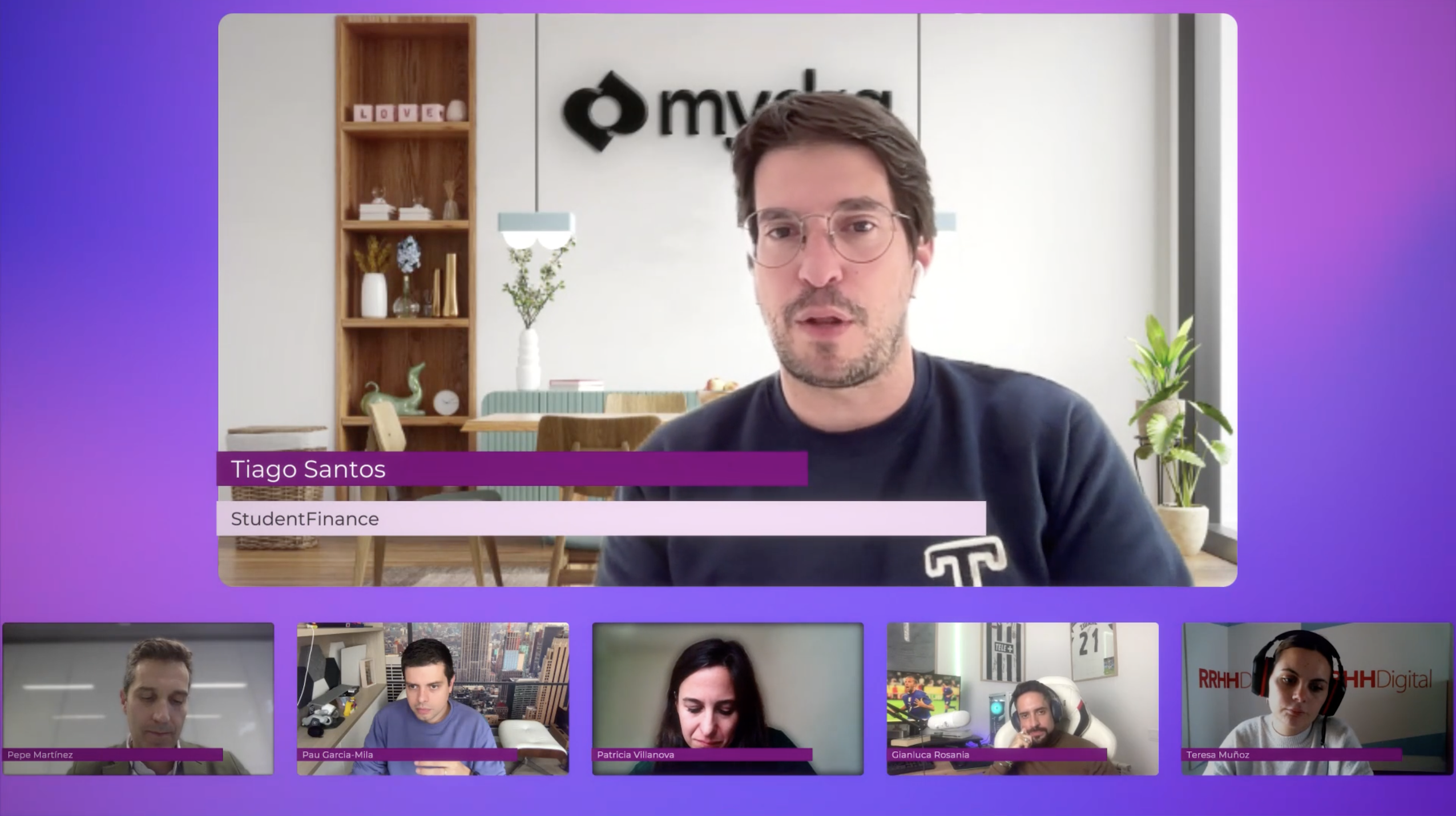In a digital age where the adoption of intelligent tools is not just a trend but a necessity, Mydra stands at the forefront, advocating for the use of Artificial Intelligence (AI) to not only streamline HR processes but to fundamentally enhance the well-being and quality of life for teams across the board. This vision was shared and expanded upon during the insightful webinar on February 1st, titled "How is Artificial Intelligence Transforming the HR World?" hosted by RRHHDigital and Founderz, and originally reported by RRHH Digital.
Our very own Tiago Santos, Director of Talent and Careers at Mydra, participated in this event, joining a panel of experts in AI, technology, and human resources. The webinar shed light on how AI is revolutionizing the HR sector by providing advanced tools for selection, hiring, management, and retention of talent. Through machine learning algorithms, companies can analyze vast amounts of data to identify patterns in employee performance, predict cultural fit and turnover probability, and tailor professional development. Moreover, AI facilitates the automation of repetitive administrative tasks, allowing HR teams to focus on strategic activities and enriching the employee experience. This transformation drives efficiency, equity, and agility in talent management, promoting a more dynamic and competitive workplace environment.
One of the recurring themes of the event was the optimization of processes through AI. Advanced natural language processing and machine learning tools have revolutionized staff selection, enabling algorithms to analyze resumes more efficiently and identify key skills and cultural matches, thus streamlining and improving the hiring process. However, the human decision behind these processes was emphasized, underscoring the blend of technology and human insight.
Furthermore, the automation of routine tasks has been a boon for HR professionals. Activities such as payroll management, interview scheduling, and performance evaluation tracking have been greatly simplified, freeing up valuable time that can now be invested in direct interaction with employees.
During the webinar, the discussion delved into the "three layers" surrounding AI, as defined by Pau García-Milà, expert in AI and Co-founder of Founderz: legality, ethics, and responsibility. The emerging concept of Artificial Responsibility and Intelligence (RAI) adds an additional dimension to the debate, highlighting that being legal and ethical does not absolve an organization from the responsibility of potential negative consequences. HR professionals are beginning to recognize the importance of responsible AI implementation, considering not just its legal and ethical viability but also its societal and individual impact.
The webinar directly addressed concerns about bias in AI algorithms, especially in the recruitment process. While these tools can accelerate hiring, there's a risk that algorithms may replicate existing biases from the training data, potentially leading to unfair discrimination. Tiago Santos emphasized the challenge of controlling these biases, acknowledging their deep-rooted presence in AI's "DNA."
Moreover, in recruitment, AI minimizes biases and suggests growth opportunities, while in managing work-related stress, it offers support through reminders and relaxation techniques. AI also enables the personalization of benefits and rewards, fostering a holistic approach that prioritizes employee well-being and satisfaction.
As the digital meeting concluded, a thought-provoking question was posed by the moderator: "What soft or hard skills should future generations possess to be selectable humans?" The panelists highlighted emotional intelligence, creativity, adaptability, the ability to learn and unlearn, hyperadaptability, common sense, and empathy with passion as essential traits for the future.
In conclusion, the integration of intelligent tools has not only improved efficiency but has also liberated HR professionals to focus on what truly matters: the people. The incorporation of AI into HR practices is not merely a tool; it's an evolution towards a more strategic HR management, centered on the individual and collective needs of employees.
We extend our gratitude to RRHH Digital for their original coverage of this enlightening webinar, and to the organizers and participants who shared their invaluable insights. If you missed the live debate, we invite you to watch the recording and join us in embracing the transformative power of AI in HR.
Credit to RRHH Digital for the original article.

